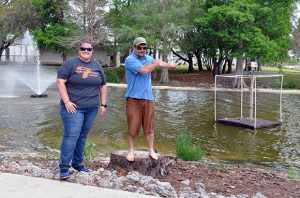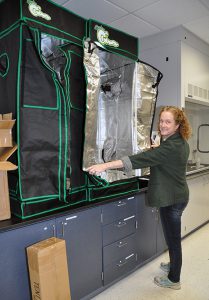- Welcome
- Campus Maps
- History
- Mission Statement
- Accreditation
- Administration
- Employment
- Human Resources Employment Process FAQ
- Position Vacancies
- Salary Schedule (PDF)
- Employee Benefits
- Paid Holidays
- Employee Handbook (PDF)
- BENCOR Special Pay Plan (PDF)
- Social Security Collection and Usage
- Affordable Care Act Notice (PDF)
- Social Security Disclosure Summary (PDF)
- Tobacco-Free College
- Drug-Free Workplace & Campuses
- Technology Usage Acknowledgement (PDF)
- Employee Safety Manual (PDF)
- SFSC’s Annual Security and Fire Safety Report (PDF)
- Calendars
- News
- Social Media
- Honoring Our Retirees
- Celebrating Our Trustees
AVON PARK, Fla. – March 26, 2020 – South Florida State College (SFSC) is partnering with Hemp4Water™ on the upcoming Florida Industrial Hemp Pilot Project. Through this project, they will research the use of industrial hemp in the removal of nitrogen and phosphorus from Florida’s lakes and rivers. The Florida Department of Agriculture and Consumer Services recently issued an industrial hemp planting permit, allowing SFSC and Hemp4Water™ to proceed with the project. This will be the first bio-remediation project using industrial hemp on water in the United States.
“Nutrients in appropriate levels are required and part of the ecosystem,” said Steve Edmonds, Hemp4Water™ founder. “However, an overabundance of nutrients, such as nitrogen and phosphorus, help fuel green-blue algae and red tide. All rivers and lakes in Florida are inundated with nitrogen and phosphorus. Everyone has been trying to reduce the content for the last 15 years.”
Dawn Ritter, Highlands County natural resource manager, said that because Lakes Glenada and Lelia are public lakes, the county wants to make sure people aren’t prevented from making use of them for activities such as boating and fishing. “The map provided with the submission toward the permit provides a good perspective on placement of the biomats for the industrial hemp,” she said. “The permit from the Florida Department of Agriculture and Consumer Services was issued for the project in February. As long as the project remains in compliance with the permit, the county shouldn’t have a problem with the project at all.”
A letter from the Florida Fish and Wildlife Conservation Commission to Kendall Carson, SFSC coordinator of agricultural programs and lead in the Florida Industrial Hemp Pilot Project, stated that the commission’s Invasive Plant Management Section had “no opposition to the industrial hemp hydroponic pilot project.” The commission required that permission had been obtained from the owner of the property adjacent to the lakes (SFSC), that the hydroponic mats would be placed so they don’t compete directly with “existing native aquatic vegetation for resources,” and “the hemp plants will not be planted into the hydrosoil.”
Established in 2013, Hemp4Water™ is a not-for-profit corporation that concentrates on education and environmental cleanup. According to Edmonds, the company focuses on cleaning water of contaminants with the use of hydroponic hemp.
Edmonds indicated that excess nitrogen and phosphorus come from a variety of sources. “It’s basically a combination of failed infrastructure in Florida built for 4 million people that is trying to deal with a population approaching 20 million people. All of the excess nutrients from our storm water system is, eventually, shunted to our rivers and lakes. Excess nutrients also come from the highways, the urban landscape, the creation of developments, and fertilizing the lawn three or four times a month rather than once or twice a year. It’s not just a single source.”
The Florida Industrial Hemp Pilot Project will make use of industrial hemp to extract nitrogen and phosphorus from water. According to Edmonds, “Nitrogen and phosphorus are hemp’s favorite food. The plants will be happy and healthy in a high nitrogen and phosphorus environment.”
The partnership between Hemp4Water™ and SFSC will accomplish the initial baseline of research—to determine how much nitrogen and phosphorus a single hemp plant can process. With the resulting data, several further projects will be developed to target and remove tons of the excess nitrogen and phosphorus, restore a healthy ecosystem, and avert billions of dollars of damage to Florida’s water resources.
SFSC will provide the research site, a certified lab, lab technicians, academically qualified researchers, and other resources to carry forth the research. Hemp4Water™ will provide contacts, research, and materials unique to this project.
The SFSC Highlands Campus in Avon Park is located on an isthmus—between two lakes—making it an ideal site for this project. The three locations that have been identified for use in the initial phase of the project are on Lake Glenada, on Lake Lelia, and in the SFSC Dr. Norman L. Stephens Jr. Health & Science Education Center.
“In the first phase of the project, we’ll have biomats in which we’ll plant industrial hemp,” Carson said. “These are hydroponic biomats that float on top of the water and will be anchored into place. We’ll allow the hemp to grow. Toward the end of the project, we’ll measure how much nitrogen and phosphorus the hemp plants remove. At the same time, we’ll set up a hydroponic control that will be housed in a lab in SFSC’s Health & Science Education Center.”
“The biomats will be placed away from any other vegetation,” Carson said. “It won’t allow the hemp plants to take root in the ground or to compete with any other vegetation. Two specific lake locations were chosen for the biomats because they are out of navigational areas for boaters.”
“After the nutrients are removed from the systems, the hemp will be harvested and the plant material can be turned into all sorts of products,” Edmonds said. In fact, hemp plant material can be used as renewable sources of energy and to produce non-toxic industrial oil, high quality natural fibers for textiles, animal food, beauty products, dietary supplements, and biodegradable plastics. Building materials made from industrial hemp are structural blocks and prefabricated panels used for exterior walls that are non-toxic, fireproof, and mold resistant. Hempcrete, made from the inner core of the hemp plant and mixed with a binder and water, weighs far less than concrete.
In recent years, SFSC has encouraged its students to participate in research through the Honors Program, class projects, or in special projects courses. “This project presents a great opportunity for SFSC students in chemistry, biology, or environmental science to gain research experience,” said Dr. James Hawker Jr., SFSC dean of Arts & Sciences. “For this particular project, students could be involved in the chemical analysis of water.”
In a letter to the Florida Department of Agriculture and Consumer Services, SFSC District Board of Trustee Chair, Tami Cullens, said, “SFSC is excited about exploring the opportunities that the hemp industry could bring to the rural, agricultural counties in the College’s service district [of Highlands, Hardee, and DeSoto counties]. Further, the economic and environmental benefits of agricultural hemp could translate into massive environmental benefits through water quality experiments along Florida’s ridge and through the biomass opportunities that future growers of hemp could realize. The benefits to Florida are huge, with the addition of a new $35 billion agricultural crop.”






